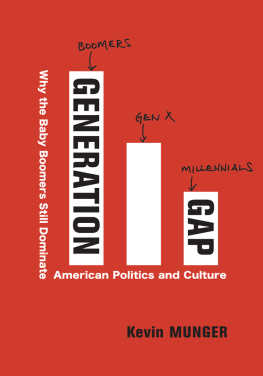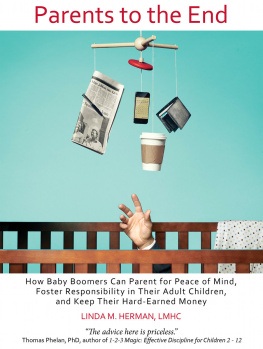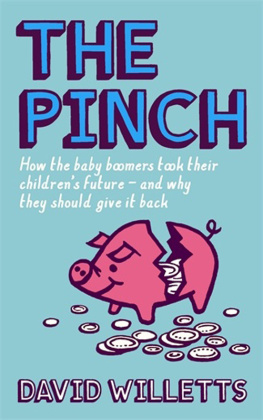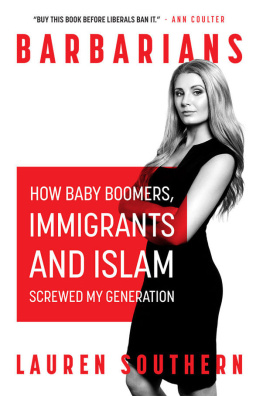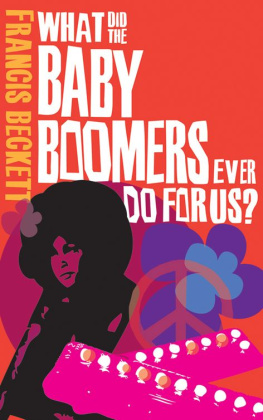Bruce Gibney - A generation of sociopaths : how the baby boomers betrayed America
Here you can read online Bruce Gibney - A generation of sociopaths : how the baby boomers betrayed America full text of the book (entire story) in english for free. Download pdf and epub, get meaning, cover and reviews about this ebook. year: 2017, genre: Politics. Description of the work, (preface) as well as reviews are available. Best literature library LitArk.com created for fans of good reading and offers a wide selection of genres:
Romance novel
Science fiction
Adventure
Detective
Science
History
Home and family
Prose
Art
Politics
Computer
Non-fiction
Religion
Business
Children
Humor
Choose a favorite category and find really read worthwhile books. Enjoy immersion in the world of imagination, feel the emotions of the characters or learn something new for yourself, make an fascinating discovery.

- Book:A generation of sociopaths : how the baby boomers betrayed America
- Author:
- Genre:
- Year:2017
- Rating:5 / 5
- Favourites:Add to favourites
- Your mark:
- 100
- 1
- 2
- 3
- 4
- 5
A generation of sociopaths : how the baby boomers betrayed America: summary, description and annotation
We offer to read an annotation, description, summary or preface (depends on what the author of the book "A generation of sociopaths : how the baby boomers betrayed America" wrote himself). If you haven't found the necessary information about the book — write in the comments, we will try to find it.
Bruce Gibney: author's other books
Who wrote A generation of sociopaths : how the baby boomers betrayed America? Find out the surname, the name of the author of the book and a list of all author's works by series.
A generation of sociopaths : how the baby boomers betrayed America — read online for free the complete book (whole text) full work
Below is the text of the book, divided by pages. System saving the place of the last page read, allows you to conveniently read the book "A generation of sociopaths : how the baby boomers betrayed America" online for free, without having to search again every time where you left off. Put a bookmark, and you can go to the page where you finished reading at any time.
Font size:
Interval:
Bookmark:
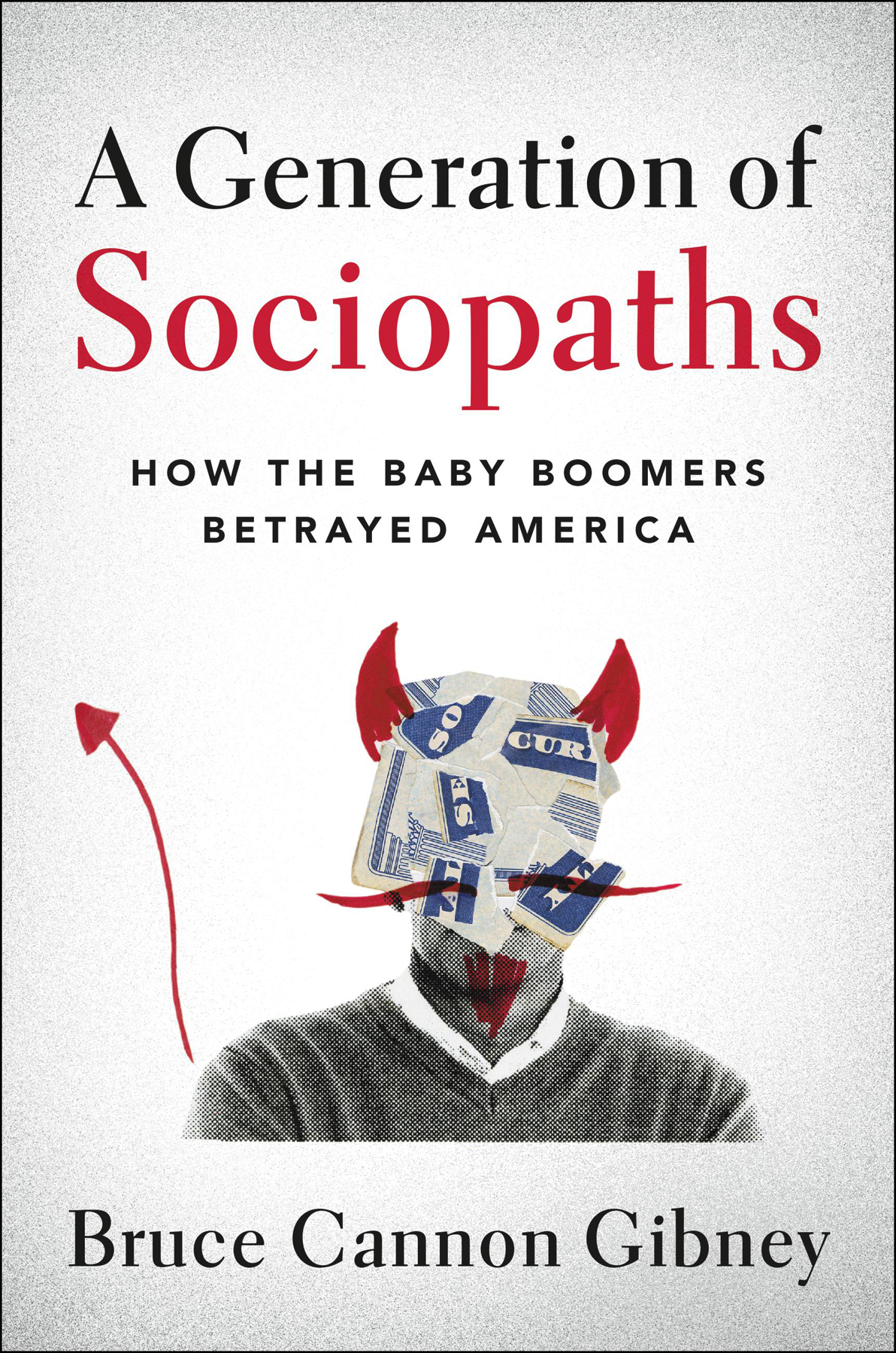
To receive special offers, bonus content, and news about ourlatest ebooks and apps, sign up for our newsletters.
Sign Up
Or visit us at hachettebookgroup.com/newsletters
Copyright 2017 by Bruce Cannon Gibney/Do Not Bend LLC
Cover design by Amanda Kain
Cover copyright 2017 by Hachette Book Group, Inc.
Hachette Book Group supports the right to free expression and the value of copyright. The purpose of copyright is to encourage writers and artists to produce the creative works that enrich our culture.
The scanning, uploading, and distribution of this book without permission is a theft of the authors intellectual property. If you would like permission to use material from the book (other than for review purposes), please contact permissions@hbgusa.com. Thank you for your support of the authors rights.
Hachette Books
Hachette Book Group
1290 Avenue of the Americas
New York, NY 10104
hachettebooks.com
twitter.com/hachettebooks
First edition: March 2017
Hachette Books is a division of Hachette Book Group, Inc.
The Hachette Books name and logo are trademarks of Hachette Book Group, Inc.
The publisher is not responsible for websites (or their content) that are not owned by the publisher.
The Hachette Speakers Bureau provides a wide range of authors for speaking events. To find out more, go to www.hachettespeakersbureau.com or call (866) 376-6591.
Library of Congress Cataloging-in-Publication Data has been applied for.
ISBNs: 978-0-316-39578-6 (hardcover), 978-0-316-39580-9 (ebook)
E3-20170120-JV-NF
To my parents, Jeb and Ling-yee Gibney
Society is no comfort
To one not sociable.
William Shakespeare, Cymbeline, Act 4, Scene 2
Great Kronos kept swallowing them as each arrived at his mothers knees from her sacred womb, intending that no other one of the illustrious children of Ouranos hold the kingly province among the immortals.
Hesiod, Theogony
W hat happens if society is run by people who are, to a large degree, antisocial? I dont mean people who are antisocial in the general sense, the sort who avoid parties and hide from the neighbors. I mean people who are antisocial in the clinical sense: sociopaths. Could a sociopathic society function? Unfortunately, this is not a thought experiment or an investigation into some ramshackle dictatorship in a distant land; it is Americas lived experience. For the past several decades, the nation has been run by people who present, personally and politically, the full sociopathic pathology: deceit, selfishness, imprudence, remorselessness, hostility, the works. Those people are the Baby Boomers, that vast and strange generation born between 1940 and 1964, and the society they created does not work very well.
Some of the sociopathic societys malfunctions appear in the daily headlines: collapsing bridges, fresh deficits, poisoned water, collapsing ice sheets, financial catastrophes, and an economy lurching from one disaster to another, with only the most anemic recoveries in between. Other disturbances lurk out of the spotlight, in the back pages of the business section, dense academic literature, and complicated government spreadsheets: pension systems now trillions of dollars underfunded, a Social Security system destined (by the governments own admission) to falter, a corrections system that presides over nearly seven million people, and a political culture so warped that the Supreme Court recently found itself unable to distinguish between gross corruption and business as usual. Individually, these items are tragic vignettes. Stitched together, they produce a cohesive and unsettling narrative of a generation thatin the many decades it has dominated political and corporate Americasquandered its enormous inheritance, abused its power, and subsidized its binges with loans collateralized by its children.
The premise of a stagnating and dysfunctional America is not particularly controversial. Blaming the Boomers might be more provocative, but after decades of dysfunction under Boomer leaders and the grotesque spectacle of recent elections, which force us to endure more of the same, provocation may be necessary. For those readers who are Boomers, or have parents or grandparents who are Boomers, it may be of small comfort that this book does not argue that all Baby Boomers are sociopaths. Rather, the argument is that an unusually large number of Boomers have behaved antisocially, skewing outcomes in ways deeply unfavorable to the nation, especially its younger citizens. The challenge is to prove it, not merely by pointing out the (by now fairly clear) correlation between American underperformance and Boomer tenure, but by establishing causal links between Boomer misbehavior and national stagnation. There is, as it happens, a diverse and large body of evidence to support the case.
It didnt have to be this way, and for a long time, nothing like Americas present dilemma seemed remotely probable. In 1946, the United States was unquestionably the richest, most dynamic country the world had seen, a nation that overcame the tragedies of the Great Depression and two World Wars to achieve remarkable gains in prosperity and freedom. Success built on success, and while there had been occasional setbacks like the Korean War, the assassinations of John F. Kennedy and Martin Luther King, the Vietnam debacle, and the stagflation of the 1970s, America just kept leaping ahead until, one day, it didnt. This is odd, because by historical standards, every challenge after 1946 was minor compared to what had come before; all should have been easily surmounted, and, for a time, most were. But the fact is that American dynamism did peter out, no later than the 1990s. The question that originally perplexed me wasnt the semi-academic paradox of the antisocial society; it was something more direct: why isnt twenty-first-century America doing vastly better? Readers under forty might pose the question a little differently, not as Have we been screwed?they already sense the answer to thatbut How badly? and By whom?
The various and dispiriting candidates of recent years have offered their own explanations for the mystery of American underperformance, though being mainly Boomers themselves and dependent on Boomer votes, they have relocated blame to other suspects: unfair trade, rapacious immigrants, vicious superPACs, greedy corporations, hyperpartisanship, foreign terrorism, a predatory 1 percent or a lazy 99 percent, too much federal government or too little, not enough Trumpism and altogether too much. Yet, the most compelling answers are not found in candidates position papers, but in the facts of the elections themselves. Not only have we heard these explanations before, in many cases we have heard them from these very same candidates, forever peddling the same magic beans of fantasy and excuse. Even the presidential election of 2016, despite its superficial weirdnessa contest between two desperately unpopular nominees winnowed out of an inventory of even less appealing also-ranswas really notable only for the sheer staleness of the leftovers.
This political recycling, right down to the surnames, should have been a sufficient reminder that the candidates had themselves been the authors and practitioners of the nations despoliation. Many candidates were incumbents or had served in other offices, and essentially all of them were members of the political and business establishment that created the mess in the first place. The only real development was that the excuses were getting more baroque as the facts got worse; the practitioners and their dogma remained the same, as they have for decades. More middle-class tax cuts, more perorations on the sacral nature of Social Security, more promises of change without any real plans for achieving it, more blame located everywhere except the obvious places. Boomer politics are like Ptolemys astronomy, where new and inconvenient evidence is explained by increasingly complicated epicycles and exceptions; the system itself is never fundamentally questioned. At some point, implausible systems have to be jettisoned in the face of overwhelming evidence, in favor of simpler and better explanations.
Font size:
Interval:
Bookmark:
Similar books «A generation of sociopaths : how the baby boomers betrayed America»
Look at similar books to A generation of sociopaths : how the baby boomers betrayed America. We have selected literature similar in name and meaning in the hope of providing readers with more options to find new, interesting, not yet read works.
Discussion, reviews of the book A generation of sociopaths : how the baby boomers betrayed America and just readers' own opinions. Leave your comments, write what you think about the work, its meaning or the main characters. Specify what exactly you liked and what you didn't like, and why you think so.

